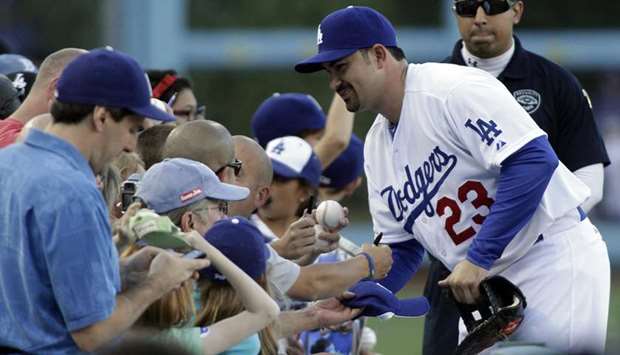Adrian Gonzalez isn’t some uninformed former jock.
He’s as thoughtful now as he was as an all-star first baseman for the Dodgers, so consider that when reading what he has to say about the possibility of a 2020 baseball season.
“I honestly don’t see a way to salvage it,” Gonzalez said in an interview with the L.A. Times this weekend. Yikes.
This is an opinion that’s informed by experience. As a player, he served on the union’s executive board. In retirement, he’s become an owner, with a portfolio that includes several Jersey Mike’s franchises as well as a stake in Calidad Beer.
And he’s never been known for making outrageous remarks for the sake of attention.
As baseball owners and players remain in a staredown over the economic and coronavirus-related health details of a potential season, Gonzalez explained why reaching an agreement would be difficult.
From Gonzalez’s perspective, saving the season would require owners to open their books, which they never have done and probably never will. So long as that’s the case, the players will remain justifiably suspicious of any of their claims of financial hardship and reluctant to accept any salary reductions proposed by the league.
Although voices in and around the game have called for a compromise, neither side has any room to budge. Transparency is an all-or-nothing issue. Partial transparency isn’t transparency.
Which is why Gonzalez is sceptical about a season taking place, however bothered he might be by how the sport’s audience would be impacted.
“I get it,” he said. “It’s about having a game for the fans.”
He is also sensitive to how the acrimonious negotiations look from the outside.
“It’s really hard to speak about losing some dollars when some people are losing their jobs,” Gonzalez said. “You don’t want to offend somebody because you know how hard everybody’s had it. You’re almost talking about what people call champagne problems.”
But Gonzalez said that didn’t mean the players should cave to the owners.
“You can’t just give up everything to get something going and destroy the whole business,” Gonzalez said.
If anything, Gonzalez believes the players have a responsibility to future generations of players to hold a line.
“I understand why people went on strike for us and I would hate for people to forget about that,” he said. The players’ strike in 1994, for example, prevented the implementation of a salary cap. That paved the way for Gonzalez, who broke into the major leagues with the Texas Rangers in 2004, to earn more than $190 million over a 15-year career. Without naming names, Gonzalez wondered how former players who were beneficiaries, the biggest beneficiaries, of previous labour efforts could turn their backs on the union. In recent weeks, former players such as Alex Rodriguez and Mark Teixeira called on players to make massive concessions to the owners to expedite the game’s return.
Gonzalez made it a point to mention how the overwhelming majority of players weren’t afforded anywhere near the financial security he enjoyed. Most of them will be out of the game by their mid-30s; many will start new careers without having gotten a college degree.
This is reality, yet Gonzalez knows players are viewed as greedy whenever they stand up to the owners.
“I think the most frustrating part about that is the fact that (the owners are) going to play this card, and the minute the agreement is made, they’re going to ask the players to help them promote the league,” he said. “But, again, it goes down to transparency. As far as revenue, what walks in the door and what is sold in the stadium and what is generated via TV, if that is put out there, then you know how much is really involved. But nobody’s doing that.”
Gonzalez said he believed the league made a mistake by proposing a sliding pay scale in which the highest-paid players would have their salaries reduced the most, by nearly 80% in some cases. Those players are not only influential, but they also have the financial wherewithal to sit out a season.

Los Angeles Dodgers’ Adrian Gonzalez signs baseball for fans before a game on August 25, 2012. (TNS)
